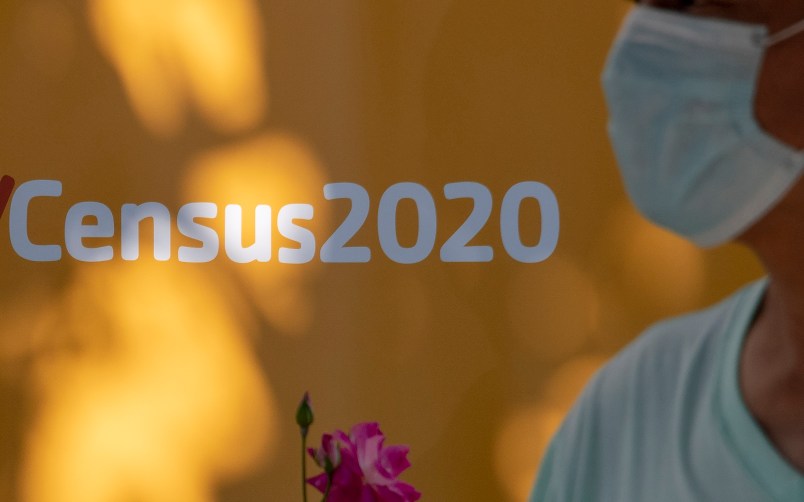New internal documents obtained by the House confirm that the Census Bureau has hit some snags as it moves through the final phases of the 2020 count, as first reported by TPM, and that the scope of the issues has increased since the Bureau identified them last month.
Fixing the “anomalies” — as the routine data issues are called — will push back until after the inauguration the date by which the Bureau can finish processing the data that will be used for congressional apportionment, according to the documents. The would mean that President Trump would be out of office before he could implement his plan to exclude undocumented immigrants from that count, which is used to determine how many House seats each state gets.
According to a document dated Nov. 27 — last Friday — the Bureau now expects it will not be able to produce the apportionment data package with the state-by-state count of undocumented immigrants until Feb. 3. The number of anomalies identified in the data have grown since the delays were first reported by TPM.
At that point, the Bureau had identified roughly a dozen issues. The number of identified anomalies has since grown by two more, according to the new documents.
House Oversight Committee Chair Carolyn Maloney (D-NY) released the documents along with a letter to Commerce Secretary Ross, demanding that the administration comply with a previously issued committee request for documents.
After TPM broke the news on Nov. 19 of the delay, Census Bureau Director Steve Dillingham issued a statement that acknowledged the anomalies but stayed mum on the specific impact they would have on releasing the apportionment data.
The Dillingham statement said only that he was “directing the Census Bureau to utilize all resources available to resolve this as expeditiously as possible.”
Dillingham has also been in touch with leaders of the relevant House and Senate committees, TPM has learned, in calls during which he was similarly coy about what impact the anomalies would have on the release date of the data, according to congressional sources.
A readout of one such call provided to TPM last week by the office of Rep. James Comer (R-KY), the top Republican on the House Oversight Committee, described the issues as “few in number.”
“Bureau officials confirmed they are working as expeditiously as possible with all available resources to finalize a complete and accurate census,” Comer said.
Meanwhile on a call with Sen. Gary Peters (D-MI), the top Democrat on the Senate committee with census oversight, Dillingham said that the schedule for releasing the data is in flux, according to a Peters aide, as the Bureau is looking at throwing more resources at the processing steps happening now.
“He didn’t provide any clear details about the resources or the timeline,” the aide, who asked not to be named in order to speak about the call, told TPM.
The lack of public confirmation from the administration that it is now expecting a late January or early February release of the data has caused concerns among the census stakeholder community that the Bureau will be pressured to cut corners so that Trump still has a chance to implement the apportionment policy.
In statement released Wednesday night, the Bureau confirmed that Dillingham had told Congress that the release of the data remained “in flux.”
“Internal tracking documents would not convey the uncertainty around projected dates and may fail to reflect the additional resources employed to correct data anomalies,” the statement said, while stressing the anomalies affected only a very small portion of the total records and that “are being resolved as expeditiously as possible.”
“What is certain is that the Census Bureau is working to thoroughly correct and address all issues and anomalies as a part of its mission to deliver accurate 2020 Census data products as close to the statutory deadline as possible,” the statement said. “No shortcuts are being taken when it comes to patching the software to correct these anomalies, or others that may be discovered as data processing continues, and resources are being added to post-data collection processing to ensure timely and accurate data is delivered for the Census Bureau’s important mission.”
According to the whistleblower documents released on Tuesday, failing to fix one of the identified anomalies may cause undercounts in some populations and overcounts in others. One of those anomalies — among those that had been identified since the delays were initially reported — risks a “significant overcount” in certain areas if it goes uncorrected, according to the documents.
A document dated for Nov. 19 is described by Maloney as a “presentation for senior Census Bureau officials. It lays out both specific anomalies and the adjustments to the release timeline that will be required to fix them. The second document, dated Nov. 27, updates that list of the anomalies, while the third, also dated that day, describes in detail the new timeline for the final steps of processing the data, given the fixes.
Maloney’s letter to Ross said that the committee would issue subpoenas if the administration continued to refuse to provide the documents the committee requested when the delays became known. The committee was initially told by the Department of Commerce that it would not be complying with the requests because of “concerns about ongoing litigation,” according to Maloney’s letter.
“By blocking the production of the full set of documents requested by the Committee last month, the Trump Administration is preventing Congress from verifying the scope of these anomalies, their impact on the accuracy of the Census, and the time professionals at the Census Bureau need to fix them,” Maloney said.
Her committee is also hosting a hearing on the census on Thursday morning. No members of the Department of Commerce or the Census Bureau are scheduled to testify.
Read the documents and the letter below:
Update: This story has been updated to include a response from the Census Bureau.



